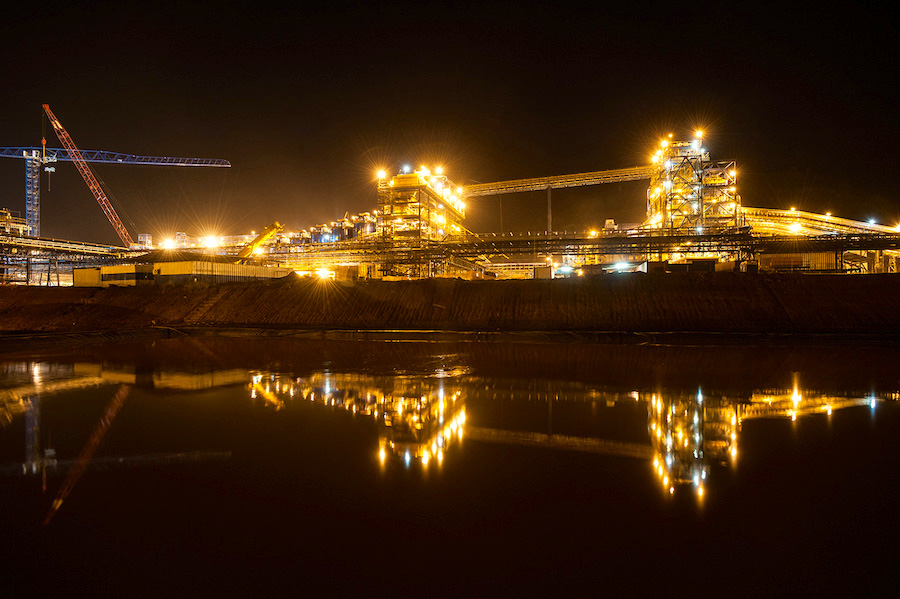AJN shares slump after Barrick moves to block Kibali stake purchase

Shares in junior miner AJN Resources (CNSX: AJN) tumbled after Barrick Gold (TSE: ABX), the operator of Congo’s biggest gold mine, issued a cease-and-desist notice to block AJN’s acquisition of a 10% stake in the mine which it says the deal undervalues.
AJN’s Canada-listed shares fell 13.9% at Thursday’s open, taking losses since Wednesday to 28%. The company’s Frankfurt listing slid 9.6% on Thursday, having lost 8.6% on Wednesday.
Barrick and AngloGold Ashanti (NYSE: AU), which each own 45% of the Kibali mine, said they had not been consulted about the deal even though the stake’s owner Societe Miniere de Kilo-Moto (SOKIMO) may not transfer or sell its Kibali shares without their approval.
The two companies and the chair of state-owned SOKIMO say AJN’s planned acquisition was prematurely announced, without notifying stakeholders or securing approval from SOKIMO’s board.
A memorandum of understanding with SOKIMO released by AJN on Feb 6 sets out a deal in which the state-owned firm’s 10% stake in Kibali, plus stakes of between 30% and 35% in five other gold assets, would be exchanged for a 60% stake in AJN.
“Cheeky at best”
Barrick has issued a cease-and-desist notice to AJN, and its executives in Congo are currently engaged with the government on the matter, chief executive Mark Bristow said.
The miner will not support the sale for reasons of valuation as well as process, he said.
“From what little we know, it’s a deeply discounted transaction,” he told Reuters. “It’s cheeky at best.”
AJN CEO Klaus Eckhof on Wednesday said the cease-and-desist notice instructed AJN to stop pursuing the asset because Barrick has first right of refusal if SOKIMO chooses to sell.
However, his firm can still go ahead with due diligence, he said. He declined to comment on what value the deal gives the Kibali stake.
Investec in 2014 valued 45% of Kibali, one of the world’s biggest mines, at $2.1 billion, meaning a 10% stake would have been worth $467 million.
Before the latest share price moves, Canada-listed AJN Resources had a market capitalisation of just $9 million, according to Refinitiv Eikon.
Asked about the gap between AJN’s valuation and the valuation of the mine, Eckhof said: “The market will adjust. The share price will be different and actually value the project.”
The deal would also give SOKIMO access to capital markets, he added.
AJN’s Canada-listed shares spiked 140% on Feb. 6, the day of the Memorandum of Understanding, and hit a record high of $1 on Feb. 7. The small-cap is thinly traded, making it more volatile.
After Thursday’s drop it was trading at $0.42, just higher than its price prior to the Memorandum of Understanding’s release.
“Surprised”
On Tuesday AJN said it had closed a $1.5 million equity issue. Eckhof said he aims to raise $15.05 million “at minimum” by the time the deal is signed.
At the close of the deal, AJN said its board would consist of two nominees from SOKIMO and three current directors of AJN, making SOKIMO board members a minority even though the firm would hold 60% of the shares.
SOKIMO chair Annie Kithima said she was “surprised” by AJN’s statement and that the make-up of the board was still to be negotiated.
“The way AJN rushed to make this public is quite puzzling to me because at the board level we were still waiting for the full report from our management,” she told Reuters.
“AJN has headed straight into a legal obstacle course”
Elisabeth Caesens, director of the Brussels-based NGO Resource Matters
Eckhof said the MoU had been approved by DRC’s minister of portfolio, who manages state-owned enterprises.
Elisabeth Caesens, director of the Brussels-based NGO Resource Matters, said: “AJN has headed straight into a legal obstacle course.”
“It’s not even sure that SOKIMO is allowed to transfer its stakes, since the mining code provides for a non-transferable 10% DRC stake for exploitation permits,” she added.
DRC changed its mining code in 2018, hiking royalties and demanding higher government participation in mining projects in a bid to benefit more from mining activities. The code caused consternation among mining companies.
Barrick said it believes SOKIMO should maintain its stake.
“We don’t believe the state should be selling that asset because it’s got so much value,” Barrick CEO Bristow said. “They should be participating in it.”
(By Hereward Holland, Jeff Lewis and Helen Reid; Editing by Jan Harvey, Hugh Lawson and Jane Merriman)
{{ commodity.name }}
{{ post.title }}
{{ post.date }}




Comments